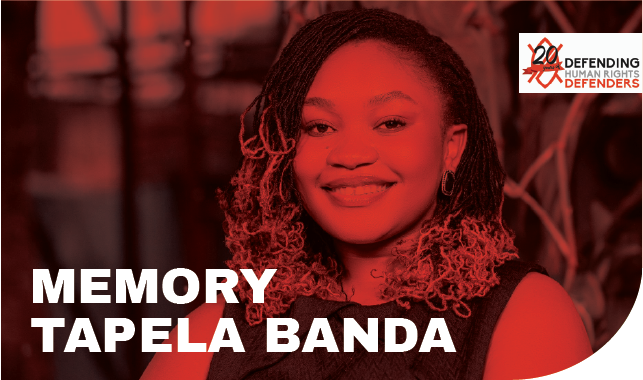“As a young woman human rights defender and founder of an organisation, I sometimes feel like I need to beg for space to be seen. The work I do is not recognised as important enough for me to deserve a seat at the table, or to receive the support that is meant to be available to everyone.”
This is a harsh reality for Memory Tapela Banda, Founder and Director of Zambian Disability Matters Organisation. Working to ensure that children and young people with disabilities are safe, protected and safeguarded in their schools, homes, churches and communities at large. The organisation works in semi-urban and rural areas, operating within nine of Zambia’s ten provinces.
As the founder of an organisation that caters to the needs of a group of people that she does not belong to, she is often faced with many questions about her intentions and her motives.
“I get the ‘side-eye’ a lot; eyebrows are raised. People wonder if I am doing this work for selfish gain. They want to know the story behind the decision I made to follow this path.”
But that has not stopped Memory. Undeterred by the challenges and society’s misconceptions, she continues to carry out activities for groups of children and young people with albinism and other types of disabilities, often taking great risks to do so, in an environment where there are still many individuals who want to attack, discriminate against, or harm the marginalised groups.
“To go on the ground, we need defense personnels, or rather professionals, that are trained to protect these children whenever we have activities, or rather to be able to safeguard them from people who might want to attack them or might want to kill them… which has put the organisation on a slow pace because we’re not able to implement more projects on ground.”
Memory is constantly searching online for opportunities for funding and training, to build her organisation’s capacity. This is how she came across a post on LinkedIn, inviting applications for the Safe Sisters Fellowship, DefendDefenders Tech’s flagship programme that offers digital safety and security training to women human rights defenders (WHRDs), journalists and media workers.
“I would apply to participate in so many different programmes; just so I can be part of something bigger than myself, but I was never invited for anything. It made me feel invisible, unheard. I had applied for the Safe Sisters fellowship in 2019, but I was not selected. However, I refused to give up and in 2020, I applied again. This time I was successful. I was so excited”
After the online component of the training, Memory travelled to Uganda where her cohort convened later that year. For the first time, Memory realised that as much as she always did her best to protect the young people that her organisation works with, she also had to protect herself. She learnt how to avoid risks that put her within the reach of perpetrators of physical harm, as well as online attacks. For her, being in a room with other young WHRDs, hearing from them about their experiences, was an enlightening moment. She learnt to view things differently.
“One of the sisters, for instance, was using art and film to spread messages on human rights. Proclaiming to the world all the safety and security issues, using art, drama, film and all of that. It was a great learning curve for me, and I thought to myself, ‘This is something we could also adopt and implement as an organisation, back at home.’”
At the end of the programme, the Safe Sisters participants were offered another opportunity. This time it was to apply for a small grant to host trainings in their respective communities on what they had been taught during the fellowship.
“I have seen most fellowships where the programme starts, there is progress, and after the wrapping-up of the fellowship, it is ‘Goodbye!’, and you never hear from them. With DefendDefenders, it was different. They showed a real commitment to actually assisting us when it comes to the things, we are passionate about and the projects we would have wanted to implement after the training… to be able to show that we learnt and understood what we were taught and the knowledge that was imparted in us.”
At first, she hesitated to apply for the small grant, thinking it would be extremely competitive, and her proposed project would not be strong enough. But in the end, she submitted a proposal for a training programme focused on cybersecurity for persons with disabilities in Zambia and was elated to be among the selected projects.
“The grant not only helped in terms of hosting the workshop but also helped us to bring various young people with disabilities from different walks of life who have not had a platform to share their stories on how they were scammed online or how they were bullied online, not knowing where to report.”
Through the workshop, which was a resounding success, young people with disabilities learnt what to do and where to report cyber-attacks. It also gave them a safe space to use their voice and share their stories and experiences.
“When it comes to DefendDefenders, they have been there for me. They have been so helpful, and I am grateful. It is good to find a space where I finally feel seen and heard.”

